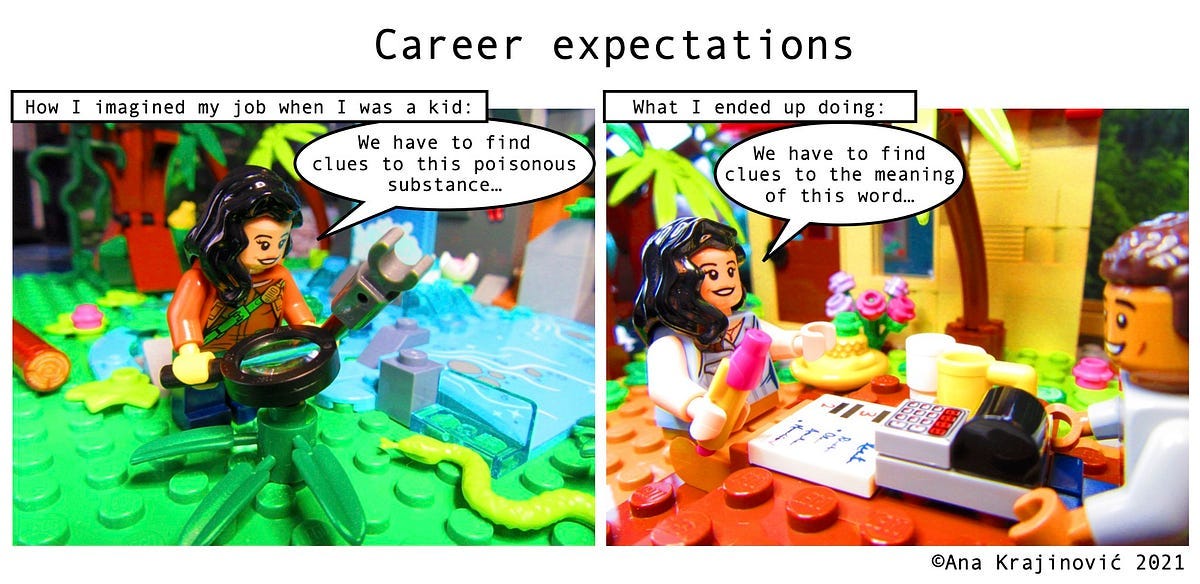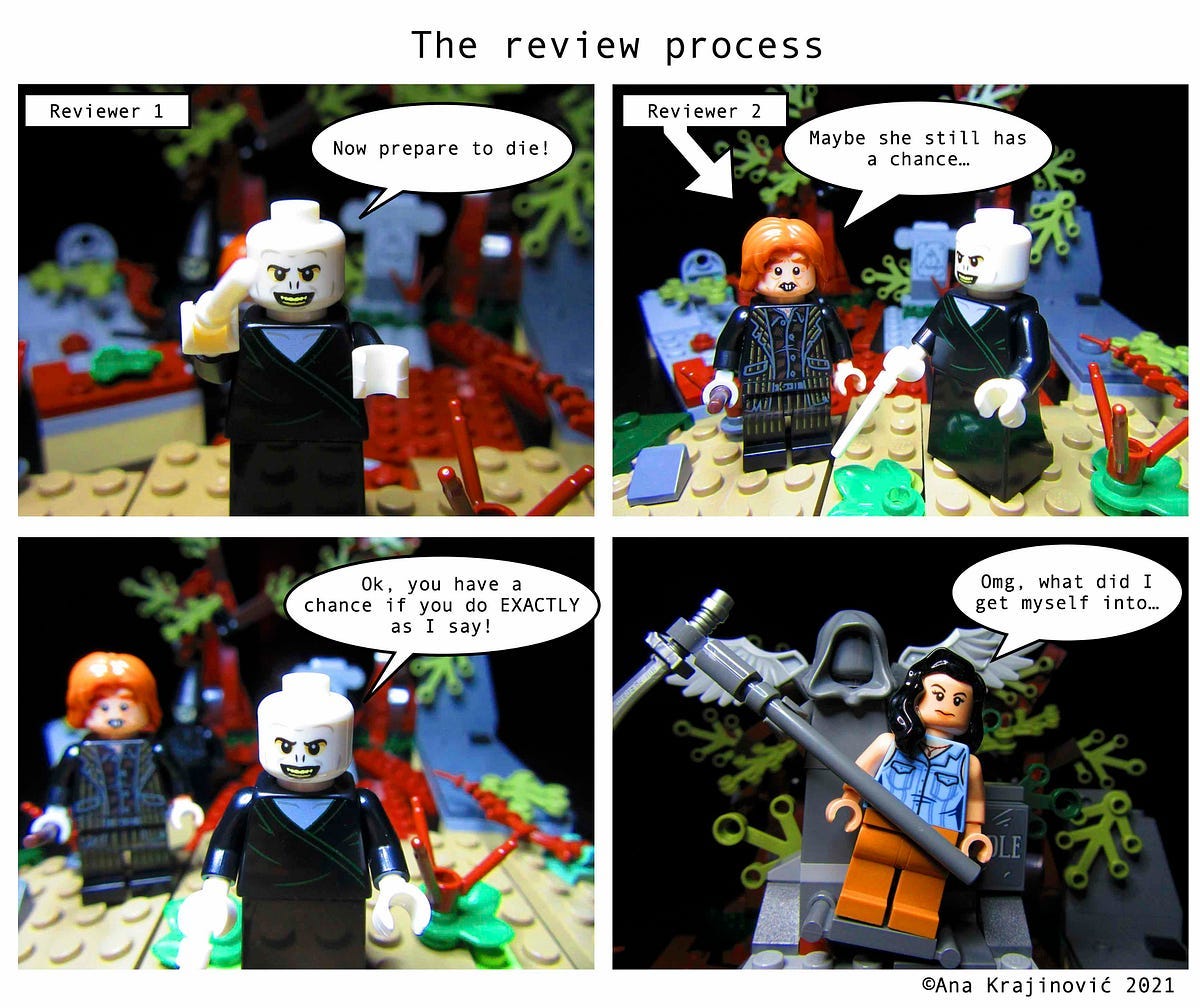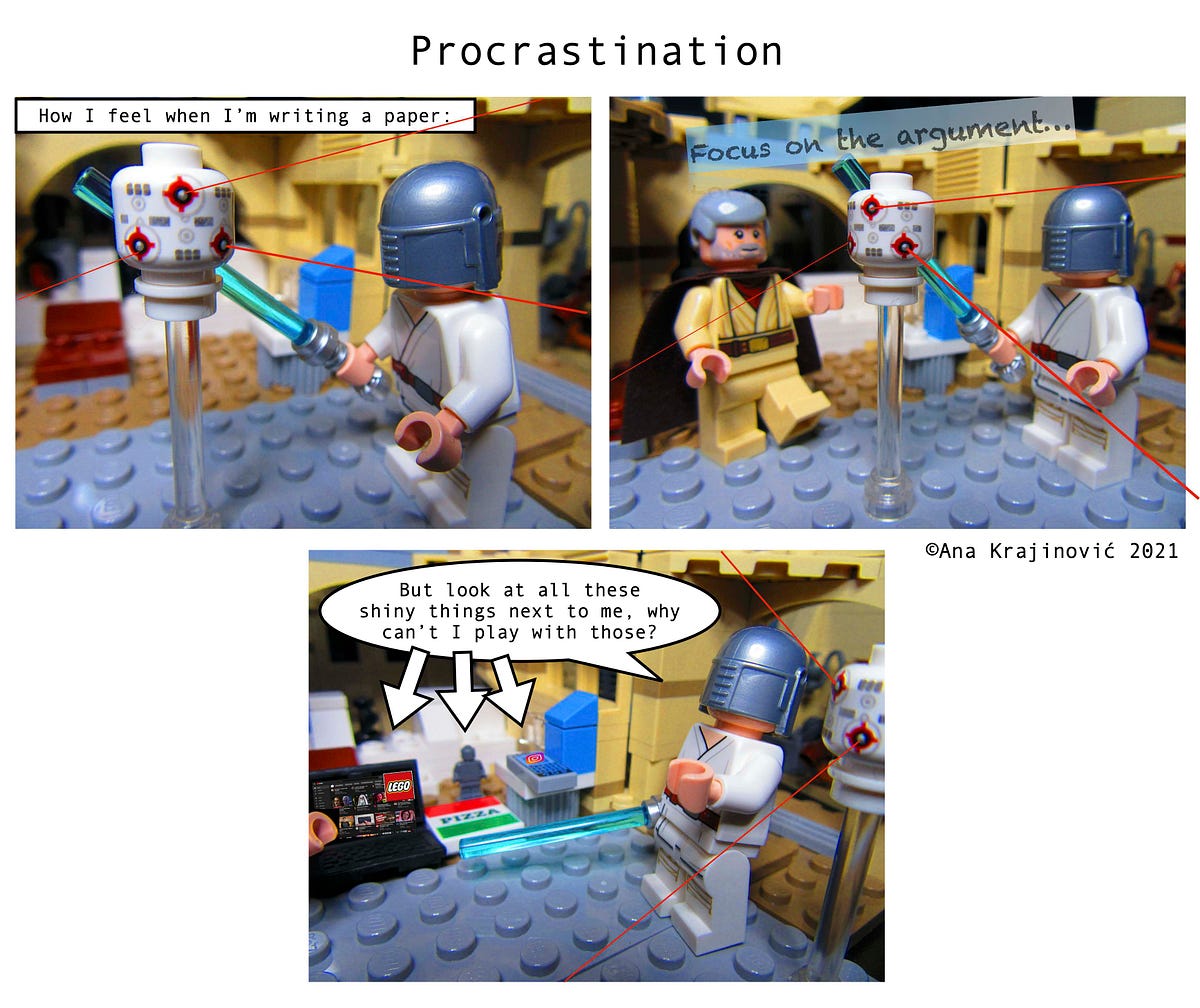The Dark Side of “Doing What You Love”
What I went through while working my dream job in academia.
LIFE LESSONS
What I went through while working my dream job in academia.
Do you have a dream job you would anything for? Note the last five words: “you would do anything for”. This is the real danger of landing our dream jobs. We would do literally anything for them and we don’t realize before it’s too late that some things might not be working for us the way they should.
This is my story of taking up my dream job, discovering its dark side, and trying to get back to its good side. I describe this process as 3 stages I went through, plus the 3.5 stage I find myself in right now. My Lego comics will illustrate some of my stories and serve as a funny diversion to this gloomy topic.
Stage 1: The bliss of finding out that doing what you love can be a job.
Everything starts with a blissful realization that the thing you love learning about can be made into a job. For someone who spent their teenage years getting convinced by everyone, from teachers and parents to school counselors, that my university degree in linguistics would never give me a job, I was insanely happy to find out that you can work as a linguist in academia (aka university and research institutes).
Of course, you can also work as a linguist in industry, but studying small indigenous languages and learning about their grammars is simply not an industry job, at least not in Europe. In fact, you can work in academia by researching almost any topic on Earth that interests you. For a knowledge-thirsty person like me, this sounded like absolute paradise. I could not believe my luck: There is a job that I will love doing and they will pay me for it.
This comic shows how my current job reflects some of the mystery and exploration I was imagining as a kid to be the defining aspects of my career. Well, even now I spend most of my time in front of the computer, but anyway…
Stage 2: Jumping through all the hoops.
My journey starts with jumping through the first hoops to get to the academic job of a linguist. Still as an MA student, I attended many talks and conferences at my university, I participated in anything to do with linguistics. Soon I landed an amazing full-time student assistant job with my supervisor. I already felt on top of my game.
On a side note, I was working so much. The student assistant job and the writing of my MA thesis occupied almost all of my time. But I felt generally satisfied that I had gotten so far already, and soon I started looking out for options for my next job: a PhD position. The process of applying to jobs, getting rejected, writing up this and that grant, getting rejected again, and finally accepted to one of them, was one of the most stressful experiences of my life. It was so stressful because so much depended on it; my only chance at doing what I love depended on it.
After arriving in Germany to do my PhD in this new position, I remember my German teacher asking the students what our dream jobs were. And I said I already got mine. Even the teacher was a bit jealous.

While doing my PhD, I always struggled with the feelings of inadequacy and imposter syndrome, but I also always pushed forward. And slowly but surely I progressed immensely in my research. However, there has always been a dark side to all of this, following me ever since I stepped into my first student assistant job.
Every hoop I jumped through, every obstacle I passed or failed, didn’t make me feel stronger. It made me feel weaker because these weren’t the kinds of problems I enjoyed solving. Maybe this wasn’t the case with every single obstacle; for example, many challenges in my research were uplifting if I felt there was a path for discovery. It is the social challenges of the inner workings of academia and its job market that more often than not demoralized me instead of energizing me.
For example, this comic shows how I perceive the review process through which all academic articles need to go through. This is basically the evaluation process that decides whether your article will be published in a scientific journal. This can be an exciting process for some people, but not for me.
Now, my story at this point can appear somewhat anecdotal. Maybe my issue with all these academic obstacles is my own and maybe it’s specific to the job I chose. And while that is possible, I think that most people who are in their “dream jobs” will sooner or later feel the exhaustion of jumping through all the required hoops. This is because, when it comes to your dream job, you are so grateful you got it that you don’t stop to ask yourself if all the hoops you are jumping through are energizing or demoralizing you.
I realized that for too long I was jumping through all the hoops and doing whatever seemed necessary career-wise, even when I wasn’t paid or rewarded for it in any way, because it’s my dream job after all. It all pays off in the end, I get to do what I love, so what’s so wrong with working more than 8 hours a day? “There is a lot wrong with that”, said my brain at some point and shut down my motivation to do literally anything.
Stage 3: The loss of motivation.
This is the stalemate stage: your brain doesn’t want to work anymore and you start freaking out, but you just can’t focus no matter what you do. You start procrastinating and it’s slowly taking over your life. This work you cared so much about is now just this horrible task that keeps haunting you and you are doing everything you can to escape from it, from watching YouTube to cleaning up, to writing a story on Medium (guilty!)…
So, what is the deal with procrastination? Why do we do it? I’ve come across a lot of different opinions about what causes procrastination and how to get rid of it (you can check out this video I like), but in my case, I’m pretty sure it’s about not wanting to jump through the random hoops anymore.
I’m tired of justifying to myself that I will spend months writing a funding proposal for a grant that has only a 12% acceptance rate. I’m tired of writing a good paper in 2 days and having to spend months revising it so it becomes “excellent” and fits some imagined journal standards.
Another way to look at this loss of interest when it comes to jumping through all the hoops is that there is no reward big enough that would correspond to what you invested in this job. And this is just because of the faulty reasoning from the start. There is no job worth overworking yourself for! And there is no dream job dreamy enough to be worth working extra hours you are not paid or rewarded for! You can overwork for a while, yes, but sooner or later, your brain will shut down and procrastinate (unless you are a robot?).
And the worst part of procrastination is that it spills over to other areas of life. It’s not just the work you don’t feel like doing anymore, it is pretty much everything. You end up feeling like nothing is worth doing anymore…(until you discover Legos and start doing Lego comics, seriously check them out here!)
Stage 3.5: Finding new interests and new meaning.
I call this stage “3.5” because I am still in the process of completing this stage, which is all about reminding yourself of what you like about the work you do and maybe finding new interests either inside or outside your work. This stage is about awareness. Why do some obstacles in my job bother me and what can I do to overcome them more easily?
It is also about learning that you don’t have to accept anything just because this is your “dream job”. It is perfectly fine not to like certain aspects of your job. Actively neglecting the fact that some things bother you, even in your “dream job”, will only lead to burnout and loss of motivation to do even the things you do enjoy.
You can finally sigh with relief. Dream jobs also have a good side: they can give us a sense of purpose and meaning, which we so desperately crave. This fills us with passion and we are ready to work! It is here that we have to be extra careful not to turn this passion against us. Do not forget to tune in with yourself once in a while and ask yourself: How is it going? Is something bothering me and how can I try to resolve it? If you do this, you will have done half of the work toward staying on the good side of doing what you love.








